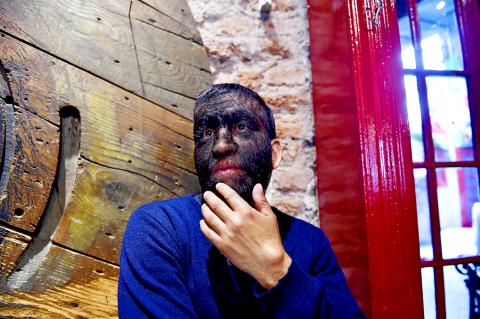Jesus Aceves might never get used to people’s stares, but after decades of alcoholism and a painful career as a circus freak, he has made a resolution: to stop burying his hair-covered face in his hands.
Aceves, a 41-year-old Mexican man, has an extremely rare condition called hypertrichosis, also known as “werewolf syndrome” — an abnormal amount of hair growth on the face and body.
Just 50 cases of hypertrichosis have ever been documented. Thirteen of them — seven men and six women — are members of the same Mexican family from the town of Loreto in the central state of Zacatecas.

Photo: AFP
One of those family members is Aceves, who goes by the nickname “Chuy” and has struggled to deal with the social fallout of the condition all his life.
“Why did God make me this way? Why am I different?” Aceves says he has asked himself since he was small.
Over the years, Aceves developed the habit of walking around with his hands over his face in an effort to dodge strangers’ stares.
As a boy, he dropped out of school, where classmates bullied him and pulled his facial hair.
He turned to alcohol at just 13 years old, developing an addiction that would haunt him for years.
To support himself, he joined a circus together with two cousins who have the same condition, earning about US$8 a day.
Hypertrichosis, which is caused by a genetic mutation, does not have any other symptoms besides hair growth.
Speaking in a warm voice, Aceves recounts his difficult life, from his traumatic childhood to his stint working at the Circus of Horrors in London.
The only time a timid smile crosses his face is when he recalls the two occasions when he shaved his facial hair for appearances on TV shows — one Japanese and one British.
“It wasn’t a very pleasant experience. I didn’t like it. I looked stranger. My face looked like Herman Munster — purple or blue,” he said.
At first, he enjoyed working in the circus, where he met his wife, a clown with whom he has a 13-year-old daughter who also has hypertrichosis.
However, over the course of more than 20 years, being a professional freak took a toll on his self-esteem.
“It damaged me, but I only realized that a long time later,” he said.
Several months ago, he started a new career, collecting bottles and cardboard for recycling.
And while he is estranged from two daughters from previous relationships — who also have hypertrichosis — he says he has finally found peace in family life.
“We’ve been lucky, we’re doing well. It’s complicated sometimes, but I think if you’re honest and decent, you can have a good family,” he said.

‘MOTHER’ OF THAILAND: In her glamorous heyday in the 1960s, former Thai queen Sirikit mingled with US presidents and superstars such as Elvis Presley The year-long funeral ceremony of former Thai queen Sirikit started yesterday, with grieving royalists set to salute the procession bringing her body to lie in state at Bangkok’s Grand Palace. Members of the royal family are venerated in Thailand, treated by many as semi-divine figures, and lavished with glowing media coverage and gold-adorned portraits hanging in public spaces and private homes nationwide. Sirikit, the mother of Thai King Vajiralongkorn and widow of the nation’s longest-reigning monarch, died late on Friday at the age of 93. Black-and-white tributes to the royal matriarch are being beamed onto towering digital advertizing billboards, on

Indonesia was to sign an agreement to repatriate two British nationals, including a grandmother languishing on death row for drug-related crimes, an Indonesian government source said yesterday. “The practical arrangement will be signed today. The transfer will be done immediately after the technical side of the transfer is agreed,” the source said, identifying Lindsay Sandiford and 35-year-old Shahab Shahabadi as the people being transferred. Sandiford, a grandmother, was sentenced to death on the island of Bali in 2013 after she was convicted of trafficking drugs. Customs officers found cocaine worth an estimated US$2.14 million hidden in a false bottom in Sandiford’s suitcase when

POWER ABUSE WORRY: Some people warned that the broad language of the treaty could lead to overreach by authorities and enable the repression of government critics Countries signed their first UN treaty targeting cybercrime in Hanoi yesterday, despite opposition from an unlikely band of tech companies and rights groups warning of expanded state surveillance. The new global legal framework aims to bolster international cooperation to fight digital crimes, from child pornography to transnational cyberscams and money laundering. More than 60 countries signed the declaration, which means it would go into force once ratified by those states. UN Secretary-General Antonio Guterres described the signing as an “important milestone,” and that it was “only the beginning.” “Every day, sophisticated scams destroy families, steal migrants and drain billions of dollars from our economy...

PRESSURE: Trump is expected to demand that Tokyo raise its defense spending, but Japan’s new foreign minister said the amount is less important than how it is spent Japan plans to show its determination to further build up its defense to rapidly adapt to changing warfare realities and growing tension in the region when US President Donald Trump visits Tokyo next week, Minister of Foreign Affairs Toshimitsu Motegi said. Japanese Prime Minister Sanae Takaichi’s administration is also finalizing a purchase package, including US pickups, soybeans and gas, to present to Trump, but would not commit to any new defense spending target at the meeting, a source with knowledge of the preparations said. The two leaders are to sit down in Tokyo on Monday and Tuesday next week during Trump’s first